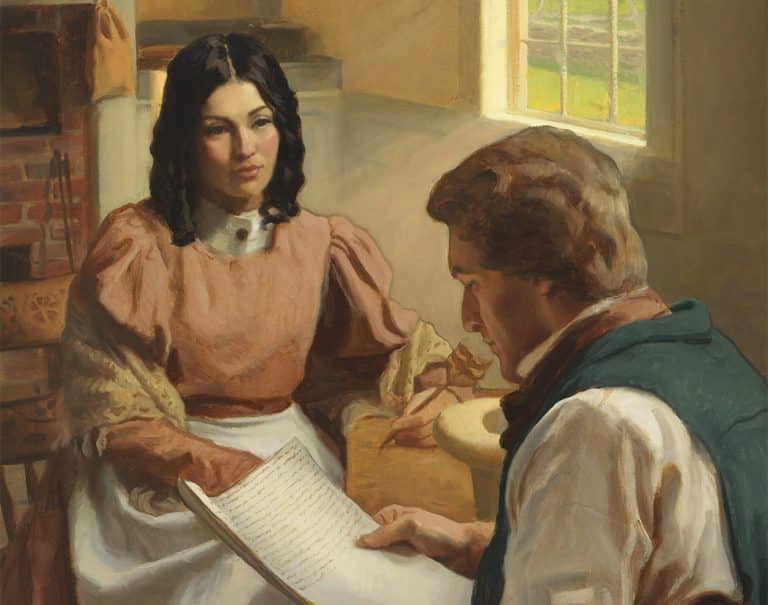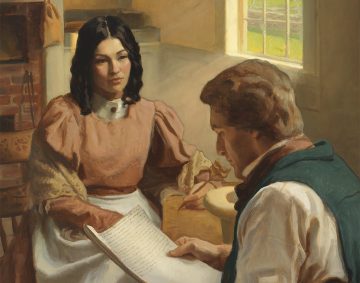Guest post by Eve
The Book of Mormon
Section 1: From the Life of Joseph Smith
This section describes Joseph Smith’s first encounter with the angel Moroni, his discovery of the plates, and his subsequent four years of education and instruction before he was able to begin translating.
The night that Moroni appeared to Joseph Smith, he had been praying “for a forgiveness of all my sins and follies, and also for a manifestation…of my state and standing before him.” Moroni informed him that he had been forgiven of his sins and began to prepare him to translate the Book of Mormon.
- What can we learn from the fact that Moroni’s vision of Joseph’s life and work was so much greater than Joseph’s was at the time he prayed?
- How can we come to know God’s purposes for our lives? How can we pray with the kind of faith that Joseph exercised in seeking revelation?
- How can we prepare ourselves to do morally and spiritually great things with our lives?
Section 2: The Book of Mormon was translated by the gift and power of God.
The Book of Mormon’s translation is one of the fundamental miracles, or “scandals,” of Mormonism. While the scandals of Old Testament and Christian miracles—the parting of the Red Sea, the virgin birth, Christ’s resurrection—are safely in the distant past and have long been part of dominant cultural and intellectual traditions in the West, Joseph Smith’s bold claims to have spoken with angels and translated gold plates are a lot more disconcertingly recent and culturally strange.
- How have you gained a testimony of the Book of Mormon’s divine origins?
- Why would you consider the Book of Mormon scripture?
- Why is the Book of Mormon necessary to our religion? Why isn’t the Bible enough?
- What does the Book of Mormon add to our faith and to our understanding of God?
- How does the Book of Mormon help us to understand the Bible–and how does the Bible help us to understand the Book of Mormon?
Section 3: The wisdom of the Lord is greater than the cunning of the devil.
This section focuses on the loss of the first 116 pages of the Book of Mormon that Joseph Smith translated, the loss of those pages, and the direction he received not to retranslate. (You might want to read or review Doctrine and Covenants Section 3 and 10, 1 Nephi 9:5, and Words of Mormon 1:7, which also deal with the issue.). The next lesson in the manual, Lesson 5 on repentance, treats this episode in more detail, so depending on the next teacher’s plans, you might want to skip this section or touch on it only briefly.
At Martin Harris’s request, Joseph Smith asked God several times for permission for Martin to show the translation to his family. The first several times Joseph asked the answer was no, but finally God said yes. Martin didn’t keep his covenant to Joseph, showed them to people he wasn’t supposed to, and ultimately lost the translation.
- Why would God grant permission for Joseph to give Martin the translation even though God knew Martin would lose it?
- What does this incident suggest about the nature of inspiration and revelation?
- What do we do when God says no? How do we handle being denied by God—or simply by the events of life—something that we very much want?
- Doctrine and Covenants 3:7 reads, “you should not have feared man more than God.” In what ways might we fear that our behavior is frustrating or inexplicable to others more than we fear that it isn’t pleasing to God? How can we maintain our integrity even when others don’t understand or accept our decisions?
- What does the existence of a parallel account suggest about repentance and about the purposes of God? How can we find hope and comfort in “alternative plans” of God as we work to repent of our sins and improve our lives?
Section 4: The Book of Mormon is the word of God.
Maybe Joseph Smith’s most oft-repeated quote about the Book of Mormon is included in this section: “I told the brethren that the Book of Mormon was the most correct of any book on earth, and the keystone of our religion, and a man would get nearer to God by abiding by its precepts, than by any other book.”
- In what sense is the Book of Mormon “the most correct of any book on earth”?
- Or, to put it differently, what exactly does the Book of Mormon’s “correctness” consist of? Is it historical correctness, or narrative fidelity to actual events?
- Does the correctness consist in a correct interpretation of the events it narrates?
- Does the book’s correctness consist of doctrinal or theological correctness in the ideas it teaches about God and Christ?
- All three? Something else?
- What, exactly, are the precepts that the Book of Mormon teaches? (You might want to list the class’s ideas on the board.)
- How exactly does living them bring us to God? (At this point you could go through the ideas the class has volunteered and ask how each contributes to increased spirituality, nearness to God, or salvation.)
- What are some of your favorite passages in the Book of Mormon, and why are they so meaningful to you?
Section 5: The scriptures cheer and comfort us and make us wise unto salvation.
- What does it mean that the scriptures “are calculated to make men [and women] wise unto salvation”?
- How are the scriptures different from other books?
- What kind of wisdom does the scriptures offer us that’s different from the many other good books available to us?
- How have the scriptures (or the Book of Mormon, specifically) cheered and comforted you?
- What doctrines are taught in the Book of Mormon that have been especially helpful and meaningful to you in living your life?
Joseph Smith says, “But when this fact is admitted, that the immediate will of heaven is contained in the Scriptures, are we not bound as rational creatures to live in accordance to all its precepts?” How can we ensure that our interaction with the scriptures doesn’t stop at study—that is, that we live by them as well as meditating upon them? How can we make ourselves doers of the word as well as hearers? (see James 1:22).
Another quote from the manual: “He that can mark the power of Omnipotence, inscribe upon the heavens, can also see God’s own handwriting in the sacred volume: and he who reads it oftenest will like it best, and he who is acquainted with it, will know the hand wherever he can see it.”
- How has the Book of Mormon helped you to recognize the hand of God—and the love of God–in your own life and in the lives of others?
- How have the scriptures helped you to understand and interpret your own life differently? How might keeping a journal of our lives allow us to incorporate something of the interpretive perspective of the scriptures into our own moral existence?
This lesson was originally written in 2008 for Relief Society based on Teachings of the Presidents of the Church: Joseph Smith: Chapter 4: The Book of Mormon: Keystone of Our Religion




9 Responses
Thanks, Eve and Exponent II! I’m teaching this week, so if anyone in my ward reads this site, the lesson will sound quite familiar 🙂
Thank you for the great questions and insight you have given this lesson this week.
I really like what you did with Section 4, Eve. You went beyond, “Why do you have a testimony that the BoM is the word of God?,” (which is the only question I could have thought of) to make questions that could potentially lead to some rich discussion.
I also appreciate the wonderful questions. Tomorrow will be my first lesson as a newly called Relief Society teacher. I have had many teaching callings over my nearly 40 years in the church, but I am more trepidacious than ever before. I am no longer “firmly rooted” in the Gospel. I have real, deep, fundamental doubts. I accepted the calling as a peace offering to my True Believing husband who is understandably disturbed by my current spiritual/religious state. I thought I could teach by asking alot of questions and letting the class share their testimonies rather than revealing that I no longer have a testimony of the Book of Mormon. I will use many of the insightful questions in the outline and hope that the sisters will be enriched by the contemplation and sharing.
Thanks for the kind words, and good luck to all the teachers tomorrow, especially to Mel, who sounds like she’s in a difficult and delicate situation. A few years ago when I was a gospel doctrine teacher there were certain lessons I got other people to teach because the topics were just so painful for me. I sounds like your situation is somewhat different, but I wholeheartedly wish you well.
Thanks so much! I got some great ideas for my lesson from this. 🙂
Thank you so much for your insight on this lesson– I have always been in Primary so teaching women is a new experience and this helped me so much! I have been struggling a lot with the Joseph Smith lessons. I taught today and everyone complimented me and said they felt the spirit. — Thank you again!
Thanks Eve. I teach the Elder’s Quorum and this will not be the first time that I draw on this series of posts to add to the lessons. This is particularly useful with this lesson since we just covered much of the same ground in Sunday School two months ago and I’m tired of discussing how or why the BoM is the keystone.
[…] how nice it would be to go to an X2 Relief Society—can you imagine getting a lesson from Eve, Lynette, Deborah, Jana, etc. every week? I’ve seen other churches organize by interests instead […]